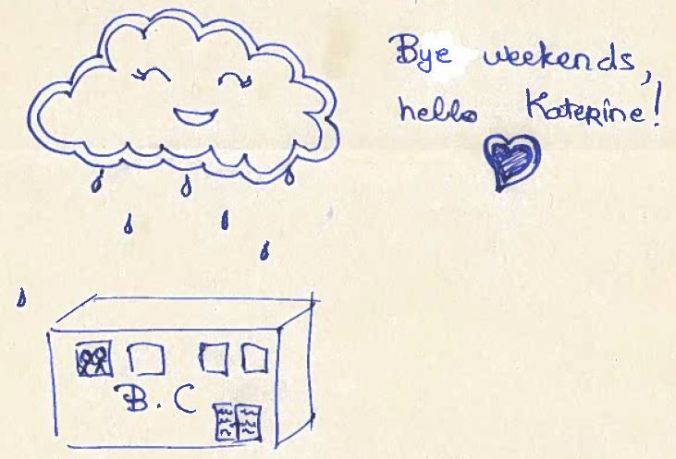I finished a course last Sunday with a lovely group of teens preparing for IELTS. Sunday groups are special: they are often miserable at the start of the day (Sunday! Morning! Nooo!), so it’s an interesting challenge to make sure they learn well and have a reasonably good time doing it. For the final reflection, I asked them to write letters to the future Sunday group, and here’s what I saw:

I think it illustrates their conflicting views on the course very well 🙂
“from now on you will have to do all the homework and work a lot. … I hope we inspired you to be a nice student of Kate’s class. P.S. She’s very great and informative”
“If you read this you are a victim of IELTS test… If you start this course from the beginning, never you hear NEVER allow yourself forget about homework.”
Now they are saying they should have done their homework!
“You should be concentrated…. Your lessons will not be tedious, I promise… Your teacher is a really proficient and friendly” “You’re very lucky person because you take part in effective course”
The ‘effective’ course taught them nothing about articles!
“Remember, you should write tedious vocabulary tests about graphs… Also, you’ll do worthwhile tests for for reading and listening but of course it will be funny because Kate is so friendly teacher”
Nice vocabulary, but where are my articles?
“The whole ritual of waking up early is actually worth the course. … Most of the times the more boring the task is, the more info and practice it gives you… Watch out for vocabulary tests, they are pretty annoying”
Ha, ha 🙂
So, my conclusions?
- Next time, I need to have a better mechanism for accountability, to give them extra motivation to do their homework on time and not regret it later
- Do more vocabulary work so that they learn a few more words apart from ‘tedious’ – and more tasks to practise articles!
- Continue to annoy them with tests 🙂
To get more out of it, I would also provide a bit more scaffolding for this activity. Here, for example, is a useful post by Jen Wieber with templates for younger kids that can be reworked for language learners. As it is, I had to have another reflection task to focus on the contents and tasks of the course in more depth, whereas better scaffolding might have saved the time.
And what about you, do you ever ask your students to write letters to future students? Do you give the future students the letters afterwards? I certainly will.









